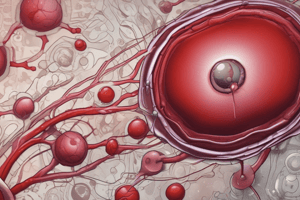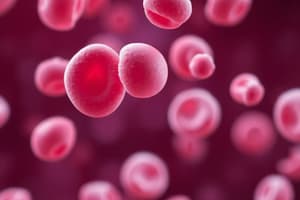Podcast
Questions and Answers
What is the World Health Organization's definition of anemia in women?
What is the World Health Organization's definition of anemia in women?
- Hemoglobin level < 12 gr/dl (correct)
- Hemoglobin level < 13 gr/dl
- Hemoglobin level < 10 gr/dl
- Hemoglobin level < 11 gr/dl
Which symptom is NOT commonly associated with anemia?
Which symptom is NOT commonly associated with anemia?
- Hiccups (correct)
- Fatigue
- Palpitations
- Shortness of breath
What is the primary description of hypochromic microcytic anemia caused by iron deficiency?
What is the primary description of hypochromic microcytic anemia caused by iron deficiency?
- RBCs are larger than 10 MCU
- RBCs are of normal size but hyperchromic
- RBCs are smaller than normal and hypochromic (correct)
- RBCs are only slightly larger than normal
What is the mean hematocrit value for adult females?
What is the mean hematocrit value for adult females?
What observable characteristic is typically found in the blood smear of a patient with severe iron-deficiency anemia?
What observable characteristic is typically found in the blood smear of a patient with severe iron-deficiency anemia?
Which of the following is considered a more reliable measure for assessing anemia?
Which of the following is considered a more reliable measure for assessing anemia?
In the diagnosis of microcytic anemia, what does a normal blood smear suggest?
In the diagnosis of microcytic anemia, what does a normal blood smear suggest?
How does acute anemia most commonly arise?
How does acute anemia most commonly arise?
What factor is critical for determining the treatment approach for iron-deficiency anemia?
What factor is critical for determining the treatment approach for iron-deficiency anemia?
Which characteristic distinguishes microcytic anemia from other forms of anemia?
Which characteristic distinguishes microcytic anemia from other forms of anemia?
Flashcards are hidden until you start studying
Study Notes
Anemia Definition
- The World Health Organization (WHO) defines Anemia as a hemoglobin level less than 13g/dl in men and less than 12g/dl in women.
- It can be assessed through Hemoglobin levels and hematocrit levels.
- Hemoglobin levels are more useful than hematocrit levels as they are measured directly.
Clinical Presentation of Anemia
- Most often recognized by abnormal laboratory tests.
- Acute anemia is often due to blood loss or hemolysis.
- Anemia can cause fatigue, palpitations, shortness of breath, pain, and low blood pressure.
- Severe anemia can lead to depletion of blood.
Physical Examination
- May demonstrate a forceful heartbeat, strong peripheral pulses, and a systolic “flow” murmur.
- The skin and mucous membranes may be pale.
Causes of Microcytic Anemia
- Iron Deficiency
- Thalassemia
- Sideroblastic Anemia
Diagnosis of Microcytic Anemia
- Iron Deficiency:
- Microcytic hypochromic RBCs
- Target cells
- Thalassemia:
- Microcytic hypochromic RBCs
- Target cells
- Basophilic stippling
- Howell-Jolly bodies
- Sideroblastic Anemia:
- Ring sideroblasts
Treatment
- Red cell transfusion is reserved for individuals with symptoms of anemia, cardiovascular instability, and continued and excessive blood loss.
- Oral iron therapy is usually adequate for asymptomatic patients with established iron-deficiency anemia and an intact gastrointestinal tract.
- 200 mg of elemental iron per day is typically given, as three or four iron tablets, each containing 50–65 mg elemental iron.
- Iron preparations should be taken on an empty stomach.
- Oral iron therapy should continue for 6–12 months after correction of the anemia to achieve sufficient iron stores (at least 0.5–1 g of iron).
Complications of Oral Iron Therapy
- Gastrointestinal distress, seen in at least 15–20% of patients.
Studying That Suits You
Use AI to generate personalized quizzes and flashcards to suit your learning preferences.




